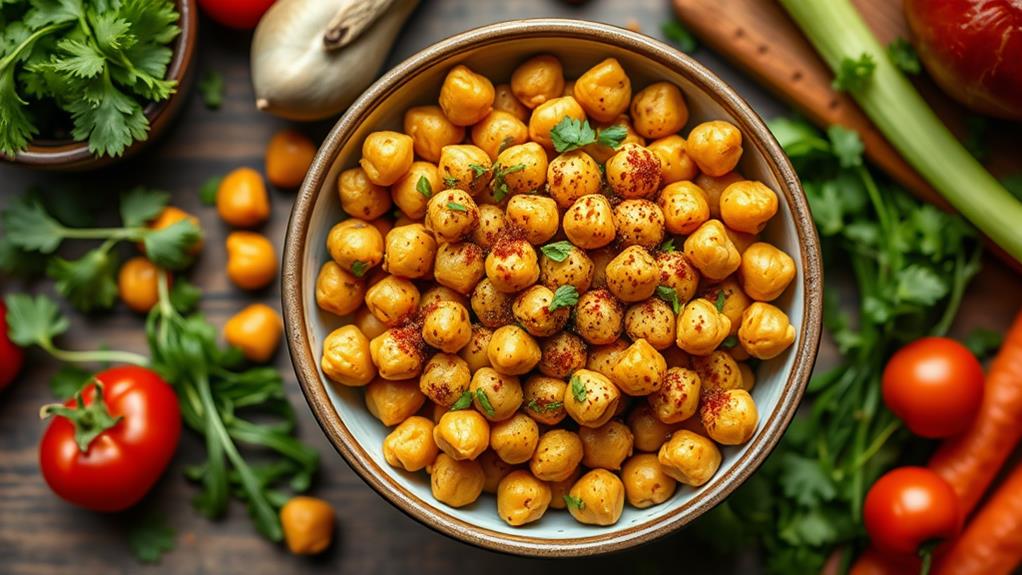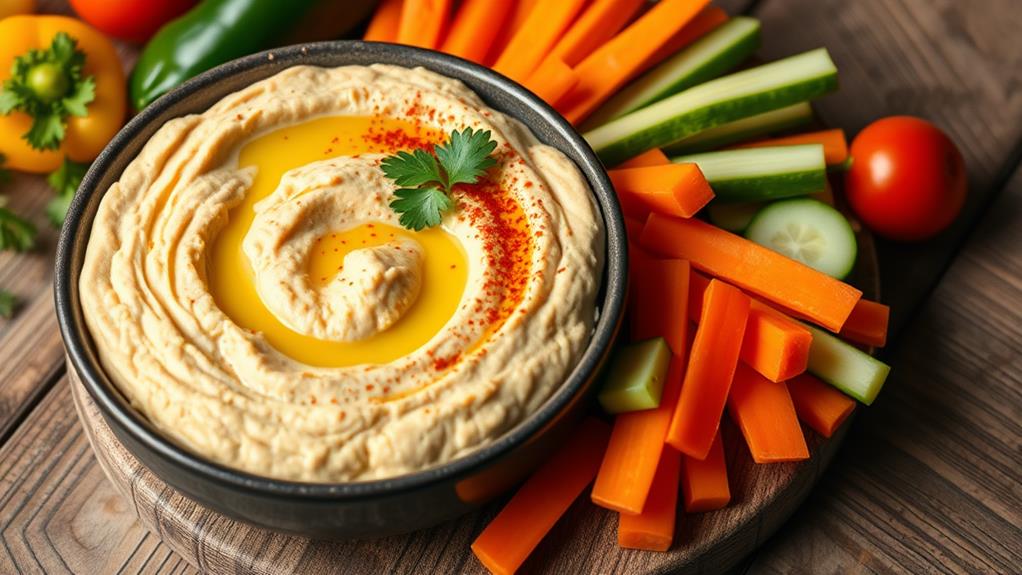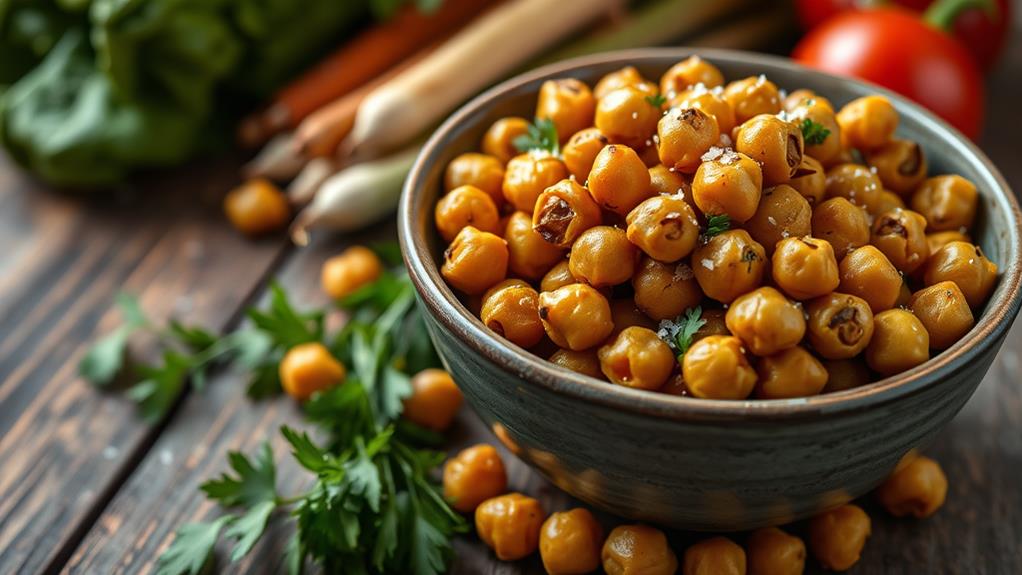Chickpeas can fit into a keto diet if you consume them in moderation. A 1/4 cup serving has about 10g of net carbs, which allows you to enjoy their high protein and fiber content without exceeding your daily carb limit. However, be cautious—a full cup contains roughly 33g of net carbs, potentially pushing you over the typical daily allowance. It's all about smart portion control and tracking your intake. By being mindful of how you incorporate chickpeas, you can enjoy their benefits while keeping your keto goals on track. There's more to ponder for your keto journey!
Chickpeas and Carbohydrate Content
When considering chickpeas for a keto diet, it's vital to understand their carbohydrate content. Chickpeas contain approximately 27.42 grams of total carbohydrates per 100 grams, but when you account for dietary fiber, the net carbs drop to about 18.38 grams. This means that even small servings can quickly add up, pushing you closer to your daily carb limit.
Maintaining proper insulin sensitivity is critical for those on a keto diet, as it helps regulate blood sugar levels and prevents cravings. For instance, a 1/2 cup serving of cooked chickpeas has around 20 grams of carbohydrates, which is nearly a full day's allowance for strict keto dieters. If you opt for a cup of boiled chickpeas, you're looking at roughly 45 grams of total carbohydrates and about 33 grams of net carbs after fiber deduction. This high carbohydrate content can lead to blood sugar spikes, making chickpeas less suitable for maintaining ketosis.
Even seemingly harmless products like two tablespoons of hummus can account for a significant portion of your daily carb limits. Thus, if you're serious about sticking to a keto diet, you need to be cautious with chickpeas and keep a close eye on their carbohydrate content.
Nutritional Benefits of Chickpeas
Chickpeas offer impressive nutritional benefits that can enhance your diet. With a solid protein content, they support muscle repair, while their high fiber levels aid digestion and help you feel full longer.
Additionally, chickpeas are low in calories and provide essential vitamins and minerals that promote overall health, making them a fantastic addition to your meals.
Incorporating low-carb vegetables alongside chickpeas can further enhance your nutrient intake and support weight loss goals.
Protein Content Considerations
For those seeking a nutritious boost, chickpeas serve as an excellent source of plant-based protein. With approximately 8.23 grams of protein per 100 grams, they're a fantastic option for anyone looking to enhance their protein intake. This protein content is particularly beneficial for muscle repair and growth, making chickpeas a valuable addition to your diet.
Chickpeas provide essential amino acids, classifying them as a complete protein source. This is especially important for those following vegetarian or vegan diets, as it helps meet your protein needs without relying on animal products. Additionally, the protein in chickpeas contributes to a feeling of satiety, aiding in hunger management and supporting your weight management goals.
However, if you're following a keto diet, you'll need to be mindful of the higher net carb content in chickpeas. While they offer a balance of energy and essential nutrients, it's vital to evaluate how they fit into your overall carbohydrate limits.
Incorporating chickpeas wisely can enhance your diet, but staying within your keto guidelines is key to achieving your goals.
Fiber and Digestive Health
Adding chickpeas to your diet not only boosts protein intake but also greatly enhances fiber consumption, which plays an essential role in digestive health. With approximately 7.1 grams of dietary fiber per 100 grams, chickpeas promote regular bowel movements and help prevent digestive issues. The high fiber content keeps you feeling full longer, which can help reduce overall calorie intake and support weight management.
Moreover, fiber-rich foods like chickpeas contribute to lowering cholesterol levels, improving heart health by facilitating better lipid profiles. This is particularly beneficial for those looking to maintain a healthy lifestyle.
Additionally, consuming fiber from chickpeas can stabilize blood sugar levels, making them a smart choice for individuals with insulin sensitivity or diabetes. The soluble fiber found in chickpeas also serves as a prebiotic, promoting the growth of beneficial gut bacteria.
This enhances overall gut health, ensuring that your digestive system functions effectively. By incorporating chickpeas into your meals, you're not just adding a nutritious ingredient; you're also supporting your digestive health and overall well-being.
Vitamin and Mineral Profile
Nourishing your body with chickpeas means tapping into a powerhouse of vitamins and minerals essential for peak health. These legumes are rich in various vitamins, including vitamin A, B-6, C, E, and K1, all of which support different bodily functions.
Significantly, chickpeas offer a substantial amount of folate—about 557 micrograms per 100g—critical for DNA synthesis, repair, and red blood cell formation.
In addition to vitamins, chickpeas boast important minerals. With 270mg of potassium per 100g, they help maintain electrolyte balance, while magnesium (79mg per 100g) plays an important role in muscle and nerve function. This combination of minerals supports overall wellness and metabolic health.
The high fiber content in chickpeas—7.1g per 100g—not only promotes digestive health but also helps regulate blood sugar levels, making them a smart choice for those on a keto diet.
Moreover, their antioxidant properties, stemming from phytochemicals like saponins and polyphenols, may reduce oxidative stress and inflammation in your body. Incorporating chickpeas into your meals can enhance your vitamin and mineral intake while providing fiber for peak health.
Chickpeas in a Keto Context

Chickpeas can be a tricky ingredient in a keto diet due to their relatively high carbohydrate content. With approximately 18.38 grams of net carbs per 100 grams, they can quickly eat up your daily allowance, especially since a 1/2 cup of cooked chickpeas contains about 20 grams of carbohydrates.
For those on a strict keto diet, where you typically aim to stay within 20-50 grams of carbs daily, this could account for up to 65% of your total intake. The high carbohydrate content in chickpeas can lead to blood sugar spikes, which may disrupt ketosis, as noted in keto research. This means your body could revert to glycogen for energy instead of staying in fat-burning mode.
While you might be able to enjoy small amounts of chickpeas in moderation, it's essential to keep a close eye on your carb count to maintain ketosis.
If you're craving something similar, consider alternatives like cauliflower or zucchini. These options provide a comparable texture and flavor while keeping your net carbs in check.
Ultimately, understanding how chickpeas fit into a keto context can help you make informed choices while steering through your diet.
Moderation and Carb Counting
When you're following a keto diet, being aware of your carb limits is crucial. A small serving of chickpeas can quickly use up a large portion of your daily allowance, so pay attention to your portion sizes.
This is particularly important because a lower carbohydrate intake leads to decreased glucose production, which is essential for maintaining stable blood sugar levels and improving insulin sensitivity.
Carb Limit Awareness
Understanding your carb limits is essential for successfully maneuvering a ketogenic diet. You need to be aware that a half-cup of cooked chickpeas contains around 20g of carbohydrates. For many following a keto lifestyle, this can take up a significant portion of your daily allowance, which typically ranges from 20 to 50g of net carbs.
Consuming just one full cup of boiled chickpeas could account for approximately 65% of your daily carb limit. This is where carb limit awareness becomes vital. You must carefully count your carbs, as indulging in a full cup of chickpeas may require you to limit other meals to stay within keto guidelines.
Remember that moderation is key; you can include small amounts of chickpeas in your diet, but you'll need to adjust your other meals accordingly. By keeping your total net carbs below the threshold for ketosis, you'll maintain the benefits of the ketogenic diet.
Ultimately, it's all about balance—enjoying chickpeas in moderation while ensuring you stay on track with your carb limits.
Serving Size Considerations
Careful serving size considerations are essential for maintaining a ketogenic diet while enjoying chickpeas. A typical 1/2 cup serving of cooked chickpeas contains about 20g of carbohydrates, which can take up a significant chunk of your daily carb allowance.
If you opt for a full cup, you're looking at around 45g of total carbohydrates, or approximately 33g of net carbs after accounting for fiber. For strict keto dieters, this can easily exceed the recommended daily net carb limit of 20-50g, potentially disrupting your ketosis.
To make chickpeas work for your keto diet, moderation is key. Small servings can fit in, but you need to plan your other meals carefully to keep your overall carb intake low. This means tracking your carbohydrate intake diligently, as even small portions of chickpeas can add up quickly.
Hummus and Keto Compatibility

Hummus can be a tasty addition to your diet, but its compatibility with a keto lifestyle requires some consideration. While hummus, primarily made from chickpeas, contains around 45 grams of carbohydrates per cup, you'll find that a typical serving size of about 2 tablespoons has roughly 4 grams of carbohydrates—equating to approximately 2 grams of net carbs. This means you can enjoy hummus in moderation on a keto diet, but you'll need to be mindful of portion sizes.
The ketogenic diet has shown promise in reducing body fat and improving metabolic health markers, making it essential to choose low-carb options like hummus wisely. However, keep in mind that many store-bought hummus options include unhealthy oils and additives that can undermine your keto goals. Making your hummus at home allows you to control the ingredients, ensuring it aligns better with a ketogenic lifestyle.
For dipping, consider using non-starchy vegetables like celery, cucumber, or bell peppers instead of traditional bread or chips. These low-carb options can help you enjoy your hummus while staying within your net carb limits.
Ultimately, if you want to incorporate hummus into your keto diet, moderation and mindful ingredient choices are key to staying on track.
Keto-Friendly Alternatives to Chickpeas
If you're looking for keto-friendly alternatives to chickpeas, consider low-carb vegetables like cauliflower and zucchini.
These options can easily adapt to your favorite dips and snacks, keeping your carb count low.
Nutrient-dense choices like spinach and broccoli can also enhance your meals while supporting your health goals.
You can also explore nut-based dips using almonds or macadamia nuts for a crunchy, satisfying alternative.
Low-Carb Vegetable Options
When looking for low-carb vegetable options to replace chickpeas in your meals, there are several delicious alternatives that can fit seamlessly into your keto diet.
Cauliflower is a fantastic choice, offering just 3g of net carbs per 100g. You can easily use it in recipes like hummus or salads.
Zucchini, with only 2.11g of net carbs per 100g, makes an excellent substitute for chickpeas, adding moisture and texture to your dishes.
Avocado is another great option, providing 1.8g of net carbs per 100g. Its high-fat, creamy texture works beautifully in dips and spreads.
If you're craving something briny, consider olives, which have 3.1g of net carbs per 100g. They add a unique flavor to salads and snacks, all while keeping your carb count in check.
Roasted mushrooms, such as Portobello or button, can mimic the texture of chickpeas in salads and stir-fries. With their low carb content, they make a hearty alternative that fits perfectly into your keto plans.
Embrace these low-carb substitutes for chickpeas and enjoy a variety of flavors in your meals!
Nut-Based Dips
Nut-based dips offer a creamy, flavorful alternative to traditional chickpea dips, making them perfect for your keto diet. Unlike chickpeas, which have a high net carb content, nut-based dips contain considerably lower net carbs, helping you stay within your carb limits.
For example, a 2-tablespoon serving of almond butter has only about 3.2 grams of net carbs, making it a fantastic choice for those following keto.
You can also whip up cashew cream by blending soaked cashews with water and spices. This versatile, dairy-free option contains around 8 grams of net carbs per 100 grams, allowing you to enjoy its richness without straying from your dietary goals.
If you prefer nut-free alternatives, sunflower seed butter is an excellent option, providing about 4 grams of net carbs per 2 tablespoons while adding a unique flavor to your dishes.
Incorporating Chickpeas Wisely

Incorporating chickpeas into your keto diet can be done thoughtfully, allowing you to enjoy their unique flavor without derailing your carb count. While chickpeas are relatively high in carbohydrates, you can still include them in moderation. A 1/4 cup serving contains about 10g of net carbs per serving, making careful carb counting essential.
To enhance your meals, consider adding low-carb ingredients like scrambled eggs and omelettes that are rich in protein, which can help balance the overall carb intake.
To enjoy chickpeas while sticking to your keto guidelines, consider using small amounts. For instance, a tablespoon of hummus has around 2g of net carbs, letting you savor their taste without exceeding your daily carb allowance. Pairing chickpeas with low-carb foods like leafy greens or non-starchy vegetables can further balance your overall carb intake and enhance your meals' nutritional value.
When you're cooking, aim for recipes that prioritize low-carb ingredients such as cauliflower or zucchini. This approach creates satisfying dishes while keeping your carb count in check.
Hidden Carbs in Common Dishes
Chickpeas can sneak into many popular dishes, often adding unexpected carbohydrates that could throw off your keto diet. For instance, a mere two tablespoons of hummus packs about 4 grams of carbs. If you're not careful, those small servings can quickly add up.
When it comes to falafel, a single serving can deliver up to 30 grams of carbohydrates, which considerably impacts your daily allowance.
Soups and stews might seem harmless, but one cup of cooked chickpeas contributes around 45 grams of total carbohydrates, potentially leading to unwanted blood sugar spikes. Packaged foods like vegan burgers and snacks often contain chickpeas or chickpea flour, hiding additional carbs that challenge your keto diet look.
Even small amounts in salads or grain bowls can accumulate; a ½ cup adds roughly 20 grams of carbs per serving. It's essential to be mindful of these hidden carbs, as they can derail your efforts to maintain ketosis.
Tracking Your Carb Intake

To successfully maintain ketosis, you must track your carb intake diligently. The keto diet typically limits daily net carbs to 20-50 grams, so every bite counts. A 1/2 cup of cooked chickpeas packs around 20 grams of carbohydrates, which can consume a significant chunk of your daily allowance. This makes careful carb counting vital.
Using tools like the Easy Keto App can simplify this process. It allows you to monitor thousands of foods, including chickpeas, ensuring you stay within your carb limits.
As you incorporate chickpeas into your meals, portion control becomes important. You'll want to be mindful of how much you're serving to avoid exceeding your daily carbohydrate goals.
Understanding net carbs—calculated by subtracting dietary fiber from total carbs—can also aid in more accurate tracking. By focusing on net carbs, you can enjoy chickpeas while still adhering to your keto plan.
Keeping a close eye on your carb intake and practicing portion control will help you maintain ketosis and enjoy your meals without the worry of going overboard. Stay vigilant, and you'll find that chickpeas can fit into your keto lifestyle.
Exploring New Recipes and Ideas
Finding satisfying alternatives to chickpeas can open up a world of delicious possibilities while keeping your carb intake in check. One fantastic option to ponder is cauliflower hummus. Using cauliflower as a base, this dip contains only 3g of net carbs per 100g, notably lower than traditional chickpeas.
Simply steam the cauliflower, blend it with tahini, lemon juice, and garlic for a creamy, low-carb delight.
Another tasty alternative is avocado hummus, which combines healthy fats with a rich texture. With just 1.8g of net carbs per 100g, it's perfect for a keto-friendly snack.
You can also spiralize or blend zucchini into a dip that mimics chickpeas' texture while clocking in at only 2.11g of net carbs per 100g.
Don't forget about nut-based dips! Almond or macadamia nut spreads can be a delicious way to indulge without exceeding your carb limits.
Pair any of these dips with non-starchy vegetables like celery, cucumber, or bell peppers.
With these low-carb recipes, you'll discover satisfying alternatives that keep your keto goals on track while treating your taste buds.
Conclusion
Incorporating chickpeas into your keto diet can feel like a balancing act between indulgence and restraint. While they offer nutritional benefits and versatility, it's essential to keep an eye on your carb intake. Enjoying hummus or chickpea salads can be a delightful treat, but moderation is key. By tracking your carbs and exploring creative recipes, you can savor the goodness of chickpeas without derailing your keto journey. Embrace the challenge and discover a satisfying way to enjoy these legumes!







